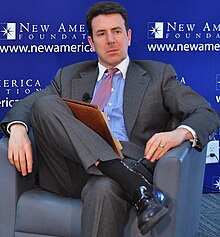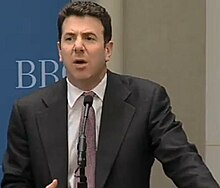
Al-Qaeda is a Sunni pan-Islamist militant organization led by Salafi jihadists who self-identify as a vanguard spearheading a global Islamist revolution to unite the Muslim world under a supra-national Islamic state known as the Caliphate. Its members are mostly composed of Arabs, but also include other peoples. Al-Qaeda has mounted attacks on civilian and military targets in various countries, including the 1998 United States embassy bombings and the September 11 attacks; it has been designated as a terrorist group by the United Nations Security Council, the North Atlantic Treaty Organization (NATO), the European Union, and various countries around the world.
Islamic terrorism refers to terrorist acts with religious motivations carried out by fundamentalist militant Islamists and Islamic extremists.

Kenneth Michael Pollack is an American former CIA intelligence analyst and expert on Middle East politics and military affairs. He has served on the National Security Council staff and has written several articles and books on international relations. Currently, he is a resident scholar at the American Enterprise Institute, "where he works on Middle Eastern political-military affairs, focusing in particular on Iran, Iraq, Saudi Arabia, and the Gulf countries. Before that he was Senior Fellow at the Saban Center for Middle East Policy at the Brookings Institution and a senior advisor at Albright Stonebridge Group, a global business strategy firm.
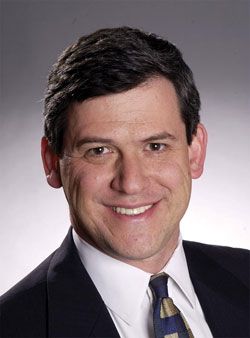
Daniel Benjamin is an American diplomat and journalist and was the Coordinator for Counterterrorism at the United States Department of State from 2009 to 2012, appointed by Secretary Hillary Clinton. Benjamin was the director of the John Sloan Dickey Center for International Understanding at Dartmouth College. In July 2020, he became president of the American Academy in Berlin, a nonprofit, nonpartisan, independent transatlantic institution in the German capital.
Walid Phares is a Lebanese-born American scholar and conservative political pundit.
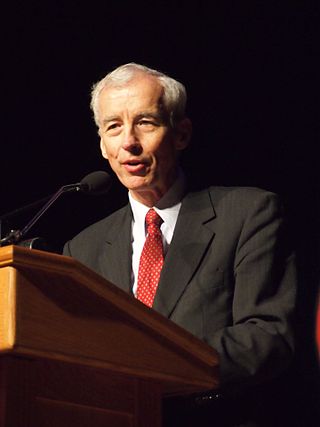
Paul R. Pillar is an academic and 28-year veteran of the Central Intelligence Agency (CIA), serving from 1977 to 2005. He is now a non-resident senior fellow at Georgetown University's Center for Security Studies, as well as a nonresident senior fellow in the Brookings Institution's Center for 21st Century Security and Intelligence. He was a visiting professor at Georgetown University from 2005 to 2012. He is a contributor to The National Interest.
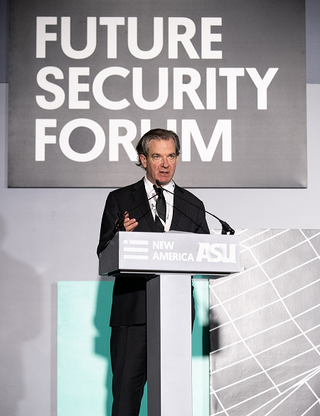
Peter Lampert Bergen is a British and American-based United States journalist, author, and producer who is CNN's national security analyst, a vice president at New America, a professor at Arizona State University, and the host of the Audible podcast In the Room with Peter Bergen.

Jihadism is a neologism for militant Islamic movements that are perceived as existentially threatening to the West. It has been applied to various insurgent Islamic extremist, militant Islamist, and terrorist individuals and organizations whose ideologies are based on the Islamic notion of jihad. It has also been applied to various Islamic empires in history, such as the Umayyad Caliphate and the Ottoman Empire, who extensively campaigned against non-Muslim nations in the name of jihad.

Islamic extremism, Islamist extremism or radical Islam refers a set of extremist beliefs, behaviors and ideology within Islam. These terms remain contentious, encompassing a spectrum of definitions, ranging from academic interpretations to the notion that all ideologies other than Islam have failed and are inferior. Furthermore, these terms may extend to encompass other sects of Islam that do not share such extremist views.

Bruce O. Riedel is an American expert on U.S. security, South Asia, and counter-terrorism. He is currently a senior fellow in the Saban Center for Middle East Policy at the Brookings Institution, and a professor at Johns Hopkins School of Advanced International Studies. He also serves as a senior adviser at Albright Stonebridge Group.
Matthew Levitt is the Fromer-Wexler Fellow and director of the Jeanette and Eli Reinhard Program on Counterterrorism and Intelligence at the Washington Institute for Near East Policy and an adjunct professor in Georgetown University's Center for Security Studies (CSS). From 2005 to early 2007 he was a deputy assistant secretary for intelligence and analysis at the U.S. Department of the Treasury. In that capacity, he served both as a senior official within the department's terrorism and financial intelligence branch and as deputy chief of the Office of Intelligence and Analysis. From 2001 to 2005, Levitt served the Institute as founding director of its Terrorism Research Program, which was established in the wake of the September 11 attacks. Previously, he provided tactical and strategic analytical support for counter-terrorism operations at the FBI, focusing on fundraising and logistical support networks for Middle Eastern terrorist groups. During his FBI service, Levitt participated as a team member in a number of crisis situations, including the terrorist threat surrounding the turn of the millennium and the September 11 attacks.

Salafi jihadism, also known as Revolutionary Salafism or jihadist-Salafism, is a religious-political Sunni Islamist ideology, seeking to establish a global caliphate, characterized by the advocacy of "physical" (military) jihadist attacks on non-Muslim and (takfired) Muslim targets, and the Salafist interpretation of sacred Islamic texts, which they believe to be "in their most literal, traditional sense", to bring about the return to "true Islam".

Bruce R. Hoffman is an American political analyst. He specializes in the study of terrorism, counter-terrorism, insurgency, and counter-insurgency. Hoffman serves as the Shelby Cullom and Kathryn W. Davis Senior Fellow for Counterterrorism and Homeland Security on the Council on Foreign Relations, and is a professor at the School of Foreign Service of Georgetown University, where he directs its Center for Jewish Civilization. In addition, he is the Professor Emeritus and Honorary Professor of Terrorism Studies at the University of St Andrews, and is the George H. Gilmore Senior Fellow at the U.S. Military Academy's Combating Terrorism Center.
Robert M. "Bobby" Chesney is an American lawyer and the Dean of the University of Texas School of Law. He is the Charles I. Francis Professor in Law and was the associate dean for academic affairs before becoming the dean. Chesney teaches courses relating to U.S. national security and constitutional law. He is also the director of the Strauss Center for International Security and Law. Chesney addresses issues involving national security and law, including matters relating to military detention, the use of force, terrorism-related prosecutions, the role of the courts in national security affairs and the relationship between military and intelligence community activities. He is a co-founder and contributor along with Benjamin Wittes and Jack Goldsmith to the Lawfare Blog. He also co-hosts The National Security Law Podcast with fellow Texas law professor Stephen Vladeck.
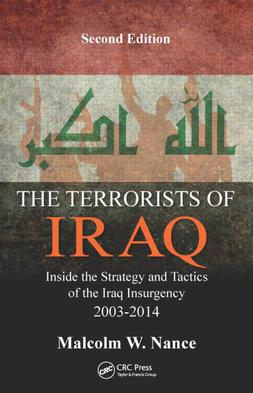
The Terrorists of Iraq: Inside the Strategy and Tactics of the Iraq Insurgency 2003–2014 is a nonfiction book about the Iraqi insurgency, written by U.S. Navy retired cryptology analyst Malcolm Nance. It was published by CRC Press in 2014. The book discusses the terrorist evolution of the Iraqi insurgency which led to the formation of Islamic State of Iraq and the Levant (ISIS). Nance cites the 2003 Iraq war by the Bush Administration for causing regional instability. He criticizes Coalition Provisional Authority leader Paul Bremer. The book emphasizes lessons the U.S. neglected to learn from the Vietnam War, the Iraqi revolt against the British, and the South Lebanon conflict. Nance writes in favor of the Iran nuclear deal framework by the Obama Administration, saying it is in the interests of all parties involved.

An End to al-Qaeda: Destroying Bin Laden's Jihad and Restoring America's Honor is a non-fiction book about counterterrorism strategies towards al-Qaeda, written by U.S. Navy retired cryptology analyst Malcolm Nance. The book describes how the September 11 attacks changed the traditional Muslim community around the globe. Nance criticizes the approach of the George W. Bush administration, including the verbiage and public presentations used in the War on Terror. The author argues al-Qaeda is not part of Islam but is instead a dangerous religious cult. Nance writes the United States should commit to better education with a public relations campaign to encourage traditional believers in Islam around the world to denounce al-Qaeda.

Terrorist Recognition Handbook: A Practitioner's Manual for Predicting and Identifying Terrorist Activities is a non-fiction book about counterterrorism strategies, written by U.S. Navy retired cryptology analyst Malcolm Nance. The book is intended to help law enforcement and intelligence officials with the professional practice of behavior analysis and criminal psychology of anticipating potential terrorists before they commit criminal acts. Nance draws from the field of traditional criminal analysis to posit that detecting domestic criminals is similar to determining which individuals are likely to commit acts of terrorism. The book provides resources for the law enforcement official including descriptions of devices used for possible bombs, a database of terrorist networks, and a list of references used. Nance gives the reader background on Al-Qaeda tactics, clandestine cell systems and sleeper agents, and terrorist communication methods.
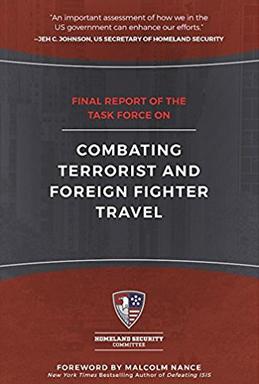
Final Report of the Task Force on Combating Terrorist and Foreign Fighter Travel is a report about counterterrorism and foreign fighters in the Syrian and Iraqi Civil Wars by a bipartisan task force of the United States House Committee on Homeland Security, with a foreword by cryptology analyst and author Malcolm Nance. The work was released by the United States Government Publishing Office in 2015 as an unillustrated committee print, by the United States House Committee on Homeland Security in September 2015 in an illustrated edition, and as a paperback book in 2016 by Skyhorse Publishing. The report discusses United States citizens leaving their country to gain fighting experience in Iraq and Syria on the battlefield. It notes some linked up with the Syrian Civil War in order to attempt to remove Syrian leader Bashar al-Assad from power, later joining ISIS. According to the work, approximately 4,500 from the Western world left their countries to join ISIS, including over 250 American citizens. The report gives thirty-two recommendations to address the problem, including tactics to stop travels of battlefield soldiers to and from their countries of origin, ways to change executive branch policies, and methods to determine which individuals are planning terrorist activities.
Bleed India with a Thousand Cuts is a military doctrine followed by the Pakistani military against India. It consists of waging covert war against India using insurgents at multiple locations. According to scholar Aparna Pande, this view was put forward in various studies by the Pakistani military, particularly in its Staff College, Quetta. Peter Chalk and Christine Fair cite the former director of the Inter-Services Intelligence (ISI) explicating the strategy.

Clare M. Lopez is an American former CIA officer and Vice President for Research and Analysis at the Center for Security Policy. She has been described as an anti-Muslim conspiracy theorist.
